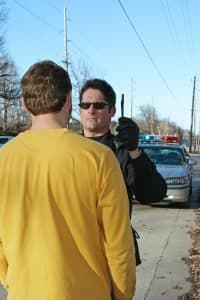
If you are pulled over on suspicion of drunk driving, the police officer will administer field sobriety tests to determine whether or not you are intoxicated. Field sobriety tests are designed to test your reflexes, coordination, balance, and cognitive functioning. These tests are also used to establish probable cause to administer a chemical test, such as a blood test or breathalyzer. The results of field sobriety and/or chemical tests can be presented as evidence in court, but a defense attorney can challenge the results when fighting the charge.
The three most commonly administered field sobriety tests are the ones recommended by the National Highway Traffic Safety Association:
- Horizontal Gaze Nystagmus
- Walk-and-Turn
- One Leg Stand
Horizontal Gaze Nystagmus
The officer will have you follow the horizontal movement of a pen, flashlight, or finger as he moves it across your field of vision. In this test, officers are looking for twitching or jerking of the eyeball to indicate alcohol consumption and/or intoxication.
Walk-and-Turn
You will be asked to walk a certain number of steps in a line, then turn around and walk the same amount of steps back. This test measures balance; inability to walk the line steadily can indicate drunkenness.
One-Leg Stand
One-Leg Stand: The officer will ask you to stand on one leg, hold your opposite foot approximately six inches from the ground, and count for 20 to 30 seconds to observe how well you can maintain balance and follow instructions. A driver can fail this test if there is any swaying in place, hopping on one foot, holding onto something for balance, or if the foot goes down before the 30 seconds are up.
An officer might also ask a driver to count backwards, recite parts of the alphabet, or perform the Finger-to-Nose test, the Finger Dexterity Test, or the Romberg Balance Test. The Finger-to-Nose test requires you to tilt your head back, close your eyes, and bring your index finger to your nose three times on each hand. The Finger Dexterity Test involves asking you to count by touching thumb to fingers. The Romberg balance test requires you to hold your balance for about 30 seconds while standing with feet together, eyes closed, and head tilted back.
Frequently Asked Questions
Yes, field sobriety tests are completely voluntary. The Arrest and Testing section of New York Vehicle and Traffic Law (VTL § 1194) requires suspected drunk drivers to take a “breath test” and/or “chemical test” but it makes no mention of field sobriety tests. An officer cannot force you to take one, nor can they punish you for refusing.
Keep in mind, though, that your refusal could be used against you in court to prove ‘consciousness of guilt.’ In addition, be careful that you do not become confrontational with police and remember to be respectful when you say that you do not want to perform the tests.
Under New York Vehicle and Traffic Law, “Any person who operates a motor vehicle in this state shall be deemed to have given consent to a chemical test.” Basically, you agree to blood alcohol count (BAC) testing the moment you get behind the wheel.
It is a civil offense to refuse a breathalyzer test. Refusal can result in a $500 fine, a one-year license suspension, and even jail time. And, the fine and length of suspension will be even higher for repeated refusals.
Sober drivers frequently fail field sobriety tests for many reasons. Medical conditions, such as vertigo, muscle tremors, or vision impairment, can affect a driver’s ability to perform the test.
The conditions surrounding the test can also play a big part in the results. These tests are often conducted in the dark with the police officer’s headlights shining right in one’s eyes. Road conditions may be uneven or slippery. Shoes, such as high heels, might make it more difficult to balance.
Beyond these physical factors, being examined by a police officer in public, with all passersby to see (including your fellow passengers), is a nerve-wracking ordeal. It would be difficult for anyone to concentrate and balance while in a highly emotional state.
An expert lawyer will be able to challenge and often prevent the results of a field sobriety test from being used as evidence. These tests can be inaccurate for a variety of reasons, including the medical and roadside conditions mentioned above.
It is also possible to prove that the test was administered improperly. The officer might have failed to explain the test clearly, or was not properly qualified to perform the test at all. A skilled attorney will hunt down any video footage of the test, which can come from the officer’s body cam, the police vehicle’s dash camera, or nearby street cameras, in order to uncover potential testing flaws.
Video footage made all the difference in the Matter of Fermin-Perea v. Swarts. In this case, an officer pulled over the driver after observing him speeding and tailgating. The officer testified that the driver was unsteady, had bloodshot eyes, and the odor of alcohol on his breath. He administered several field sobriety tests and ordered the driver to take a breathalyzer test, which he refused.
In court, video evidence revealed that the driver completed all the tests perfectly and did not exhibit unsteadiness or any other signs of intoxication - contrary to the officer’s testimony. Therefore, he was entitled to refuse the breathalyzer because the officer had no right to request it in the first place, as he had no “reasonable grounds'' to believe the driver was intoxicated. Field sobriety tests play an important part in establishing those grounds.
If the court had ruled solely based on the officer’s testimony, this driver would have temporarily lost his license and paid hundreds of dollars of fines. That’s why it is essential to have an attorney who will hunt down all the evidence and successfully challenge false DWI and DUI charges.
Who Should You Contact?
If you were charged with drunk driving (DWI/DUI) in New York, contact Rosenblum Law. Our attorneys have years of experience fighting DWI cases and obtaining excellent results for our clients. E-mail or call us today at 888-815-3649.


